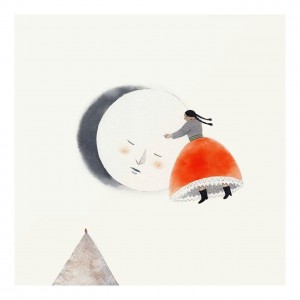
题图 / Karina Cocq
六节诗
九月的雨落在屋子上。
在渐暗的光线下,老祖母
和孩子一起坐在厨房里
小小的大理石壁炉边,
读着黄历上的笑话,
用谈笑掩饰自己的眼泪。
她想着自己秋分时的眼泪
还有敲打着屋顶的雨
全都写在黄历上,
但只有祖母才能知晓。
铁壶在炉台上唱歌。
她一边切面包一边和孩子说话。
喝茶的时间到了;但是孩子
正看着茶壶小小的坚硬的眼泪
发疯般在滚烫的黑色炉台上跳舞,
应当和雨水在屋顶上的舞姿相同。
收拾利落,老祖母
挂起了聪明的黄历。
挂在它的系带上,黄历就像一只鸟
半张着翅膀盘旋在孩子和
老祖母的头顶
她的茶杯里装满了黑褐色的眼泪。
她颤抖着说她觉得这屋子
很冷,往炉子里填进更多的木柴。
它理应如此,大理石壁炉说。
我知道我所知道的,黄历说。
孩子用蜡笔画出一座僵直的屋子
一条蜿蜒的小路。然后孩子
把一个纽扣就像眼泪一样的男人放进屋子
骄傲地把它拿给祖母看。
但是在暗中,当祖母
在壁炉边忙活的时候,
小小的月亮就像眼泪一样坠落
从黄历书页的间隙中
落在孩子
小心布置在房间前面的花床上。
是时候栽种眼泪了,黄历说。
祖母对着神奇的壁炉唱歌
而孩子开始画另一座难以言说的屋子。
作者 / [美] 伊丽莎白·毕晓普
翻译 / 光诸
Sestina
September rain falls on the house.
In the failing light, the old grandmother
sits in the kitchen with the child
beside the Little Marvel Stove,
reading the jokes from the almanac,
laughing and talking to hide her tears.
She thinks that her equinoctial tears
and the rain that beats on the roof of the house
were both foretold by the almanac,
but only known to a grandmother.
The iron kettle sings on the stove.
She cuts some bread and says to the child,
It's time for tea now; but the child
is watching the teakettle's small hard tears
dance like mad on the hot black stove,
the way the rain must dance on the house.
Tidying up, the old grandmother
hangs up the clever almanac
on its string. Birdlike, the almanac
hovers half open above the child,
hovers above the old grandmother
and her teacup full of dark brown tears.
She shivers and says she thinks the house
feels chilly, and puts more wood in the stove.
It was to be, says the Marvel Stove.
I know what I know, says the almanac.
With crayons the child draws a rigid house
and a winding pathway. Then the child
puts in a man with buttons like tears
and shows it proudly to the grandmother.
But secretly, while the grandmother
busies herself about the stove,
the little moons fall down like tears
from between the pages of the almanac
into the flower bed the child
has carefully placed in the front of the house.
Time to plant tears, says the almanac.
The grandmother sings to the marvelous stove
and the child draws another inscrutable house.
Elizabeth Bishop
最近的世界发生了一些奇异的变化。街上的饭馆已经开始重新热闹起来,人们似乎已经开始报复性消费。但是小区的隔离措施似乎更严格了。进小区必须要下载一个“健康通”软件,扫码才能进入。我不无惊恐地发现这个软件不但能够知道头发增长两寸的我和身份证上是一个人,还知道我并没有住在身份证上的地址,输入新地址时,发现它知道我们小区里的每一个房间。我当时觉得就像在读刘慈欣写的另一个版本的《1984》——中国人领导的地球联合政府为了从大瘟疫中拯救地球,建立了一个巨大的电子项圈体系,blablabla。从全球看,有大概率今年消灭不了那个病毒,人类将和它长期共处。未来我们将会面对一种大圆套小圆的奇妙循环,一种相当魔幻的生活状态。在这种时候,应当备一些百读不厌的经典在身边,于是我想起了这首我仰视了二十几年的诗。
“六节诗”是源自法国的一种古典诗歌形式,它要求每一小节有六行,每一行有一个关键词。下一小节也要有六行,在这六行中,六个关键词要以一种规则交换位置。以这样的规律,一共写六小节。然后有第七小节,可以是三行,也可以是五行,作用就像“三句半”的那个“半句”,也要出现前面的六个关键词。可以说,这种诗体具有明显的文字游戏的意味,但是写好了会有一吟三咏,回旋萦绕的意味。然而,毕晓普发现了这种诗体的另一种可能性,她使用六个关键词“雨”、“祖母”、“孩子”、“炉”、“黄历”、“眼泪”,在重复这些关键词的过程中,层层推进讲了一个故事。
但是这个故事仍然具有迷一样的色彩,它就像一座语言的迷宫。这首诗有一种奇异的特性:虽然它很短,但是你却似乎永远不可能记住它的所有细节,过一段时间再读,你会觉得有一些无素增加了会减少了,或者移动了位置。它就像一幅会动的画,永远也看不完。
更可贵的是,大师并不只限于炫技,她还在其中注入了货真价实的人类的感情,和对生活的真实感受。随着岁月的增长,我们知道了很多关于自己命运的秘密,但我们只能忍住泪水,继续生活的循环。是时候播种眼泪了,只有你,或许还有厨房的炉台知道,它将在什么时候生长成小小的月亮。
荐诗 / 光诸
2020/03/23
第2571夜
Published 2020/03/23
Last updated: 2020/03/23

近期评论